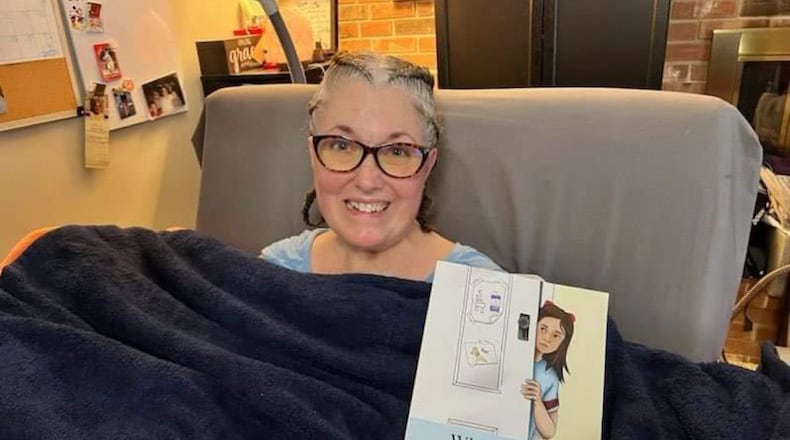“I experienced weakness in my hands. My legs felt like I had 25-pound sandbags around my ankles. I also was having trouble keeping my balance,” Reno said.
Reno was diagnosed with ALS — also known as Lou Gehrig’s disease — on January 27, 2021.
ALS, or amyotrophic lateral sclerosis, is a progressive neurodegenerative disease that affects nerve cells in the brain and spinal cord. There is no cure for ALS.
Since her diagnosis, Reno has taken to educating people about ALS with informative social media posts and visiting the Ohio State Capitol to advocate for more funding for those living at home with the disease.
Most recently though, Reno — who types with her eyes by using a special communication device — wrote a children’s book titled “Where is My Aunt Kathy?”
“I have a great-niece that has spent time at our house since she was born,” said Reno. “She was kind of my buddy. At the time she was my only great-niece. She would always come up to me and talk to me and was excited to see me. As things progressed with the disease, I noticed that she was less excited to see me. I would run around with her, and now I’m in a wheelchair. I can only imagine what she was feeling. She was unsure of what was going on. I know that it had to be scary for her.”
Reno said she can look back on certain pictures with her niece and can tell “exactly what was going on with her.”
“I know the last picture I had taken with her before changes started,” she said. “I know it has to be scary. Scary isn’t always a bad thing.”
Reno had worked for the Clark-Shawnee Local School District for six years when she was diagnosed.
“(I was) helping children solve problems daily. It was only fitting to help my niece navigate and help her understand what was going on with me,” she said. “My other great-nieces and -nephews are unsure and seem afraid of me. I tend to struggle with it because I love each of them, and the last thing I want is for them to be afraid of me.”
In the From the Author statement in her book, Reno said she was blessed to work with children every day, but her dream job came to a screeching halt when she was diagnosed with ALS.
“I quickly realized that children had trouble processing the changes that took place with me. This especially rang true with my niece,” she wrote. “I wrote this story to help open the door for conversation.”
Former State Rep. Kyle Koehler is a friend of Reno. He said long before ALS started to attack Reno’s body, she was a ”dynamo in the lives of students and their families in the Clark-Shawnee school district.”
“Her battle with Lou Gehrig’s Disease has not diminished that same passion as she fights for others battling this terrible disease,” he said. “When she came all the way to Columbus just to advocate for ALS home care funding, it was just another example that Kathy Reno is a champion for everyone no matter what struggle they face in life or where she is at in that struggle. Kathy Reno is my hero.”
Reno said the biggest misconception about ALS is even though people can’t speak or are possibly unable to move parts of their body, they still are completely aware of everything and do remember people and things.
“Our body might be shutting down, but our brain is fully intact,” she said. “As long as I am on this side of heaven, I will never stop advocating, educating and helping people navigate through ALS.”
Reno — who maintains her strong faith in Christ and her sense of humor — is currently also writing a book about her personal journey with ALS.
“I chuckle because I really don’t like to read,” she said.
Reno said she is fortunate that “we live in a world of technology.”
“I can control things with my talking device: lights, TV, the fan, blinds and much more,” she said. “I am able to control my wheelchair with my eyes. I have a friend whose dad had ALS when she was 12. She said that he used his big toe and had the old school texting style alphabet. I consider myself very lucky.”
Reno said she would love to see a day when someone says that they have ALS and it does not have to be followed with, “Lou Gehrig, ice bucket challenge or Stephen Hawking.”
Hawking was a well-known theoretical physicist and cosmologist who was diagnosed with early-onset ALS at the age of 21.
“This disease is under-educated and underfunded for research,” said Reno. “I celebrated my third year of life (since being diagnosed). I figure it is a blessing each year I live.”
“Where Is My Aunt Kathy?” is illustrated by Terra Stanley of Dayton and is available on Amazon for $11.95.
About the Author

